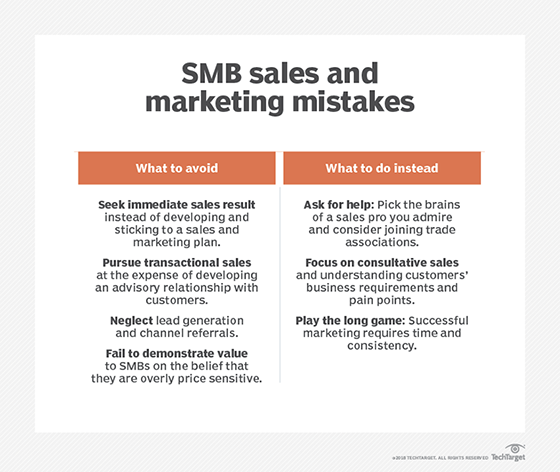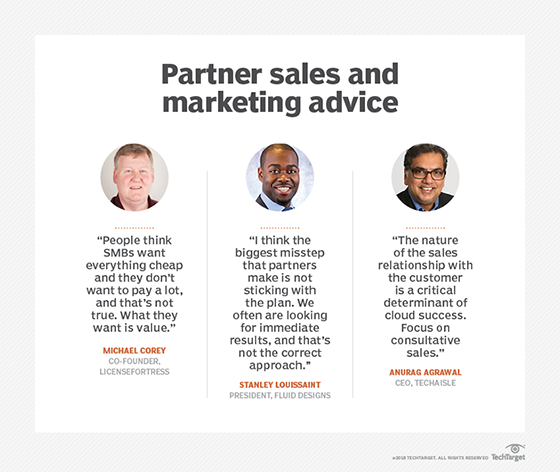
patpitchaya - Fotolia
Marketing for MSPs: How to target SMB customers
When it comes to targeting SMBs, partners often trip up in their sales and marketing efforts. Channel experts discuss sales and marketing for MSP businesses and the common mistakes.
Not long ago, Stanley Louissaint, president of IT consulting and services firm Fluid Designs, was driving on a major roadway and passed six billboards with a friend's face on them. That made an impression. "He is a real-estate agent and understands that he needs to work very hard to penetrate the market consistently," he said. "Marketing cannot be a one-trick pony."
Yet, sales and marketing for MSPs and other channel firms can be an area that company executives neglect, Louissaint observed. "In fact, many of us are not sales people by default" but rather are technicians or practitioners who have morphed into the role.
"All of a channel firm's [sales and marketing] strategies will be fruitless if you cannot close the sale once that prospect that you fought for is in front of you. It is extremely important to spend money on self-development to help you in your sales process," he added.
That sentiment is shared by Michael Corey, co-founder of LicenseFortress, an Oracle license management and audit protection service, who noted that most managed service providers targeting small and medium-sized business (SMB) customers "are great technologists, but they're not business people and weren't trained to be business people."
It's fair to say sales and marketing efforts are not the bailiwick of channel firms. We asked industry experts to discuss the common mistakes when it comes to selling and marketing for MSPs, the misperceptions about SMB customer needs and how they can improve their efforts.

What are the common missteps that happen in sales and marketing for MSPs?
Louissaint: I think the biggest misstep that partners make is not sticking with the plan. We often are looking for immediate results, and that's not the correct approach.
Corey: [Channel firms] get one or two customers, then they think they can build this into a business. But they don't understand making money and cash flow. Cash flow is far more important to a business than profit and loss in the early days, for sure. ... It's rare to have great communication skills out of the gate … [Partners are] not business people. They suffer from the 'If I build a better mousetrap, they will come' [mentality]. But if [a prospect has] never heard of you, they're not going to do business with you.
Anurag Agrawal, CEO of Techaisle, an SMB and channel research firm: Techaisle research shows that two-thirds of channel firms that are very profitable with cloud report that they have consultative relationships with customers (where they identify and deploy a solution to meet immediate business objectives) and another 27% have advisory relationships (which includes both short- and long-term strategizing to understand the business pain points and coming up with solution options). Channel partners that are just starting to be profitable with cloud are evenly split between these categories, with 55% reporting that they enjoy consultative relationships with customers and 43% reporting that they have advisory relationships.
Members of the 'not comfortable with' [and] 'not profitable in the cloud' group have a completely different approach to sales: Eighty-two percent report that they have transactional relationships, with just 13% reporting that they have advisory relationships with their customers and only 5% stating that they have consultative relationships. This is a particularly important point because channel members struggle with how best to align sales with cloud opportunities.
This data indicates that the current sales staff in firms that have not yet migrated to the cloud may be unable to help their firms make the transition. Successful firms build longer-term, higher-value relationships. Channel members who are not successful in the cloud may need to rethink their sales approach if they are looking to build a profitable cloud business.
lead generation is critical. ... Referrals from other partners are an important source of business for firms that are making money in the cloud. Thirty-seven percent report that channel referrals are an effective lead-generation method, versus 26% of firms that have recently become profitable in their cloud businesses and just 11% of firms struggling with cloud profitability. Firms that are comfortable with [or] successful in the cloud also integrate inside sales into lead generation more often.

What are the misperceptions partners have about the SMB market? When it comes to sales and marketing for MSPs, what approaches work -- considering the typical SMB customer is resource-constrained and has little-to-no IT staff?
Corey: People think SMBs want everything cheap and they don't want to pay a lot, and that's not true. What they want is value. They're not as price-sensitive as people think. They're shrewd and smart, and they watch their dollars. If they can get something for $1,000 a month but you have something of value for $13,000 a month, they'll pay it if it solves a problem for them. ... They're not stupid and they want you to prove value.
We say, 'We want you to buy for a year, but for the first 90 days you can try it.' That's proving my worth. We did tons of this [free-trial approach], and then proved ourselves and they became annual clients.
Also, if you tell [an SMB customer] you're going to do something, you have to do it. An SMB is on top of the entire business and if you say you do A, B, and C and ... only do A, they're going to call you on it.
I don't mind, as a business owner, having little or no business resources in the early days, because it forces you to think about things differently. When you only have $10 but need $100, it forces you to reevaluate things. Most SMBs don't have enough resources when they start. Apple started in a garage. So having a lack of resources and figuring out how to do more with less causes you to think about problems differently and that makes you stronger and more efficient later on. That's the reality of being a startup or a small business. … You learn to make do and stretch what you have and learn to make sure what you actually have really works. A lot of big companies waste resources, and if you can survive those early days with a lack of resources and you get a pretty efficient business going, it makes you very competitive.
Louissaint: A misconception that I've seen is that these businesses don't have the resources for us. Imagine that you are targeting clients who at the same time you think can't afford you. I've heard this over and over again when speaking to colleagues. ... The reality of this is it is our job to help people see the value in our offerings to their business. We have to help [SMBs] understand how what we do is valuable to them instead of just trying to 'wow' them with what we can do.
Agrawal: SMBs adopt technology in response to a pain point. For 83% of SMBs, technology is more important today than it was three years ago, but 72% have adoption inertia because they find technology complex. SMBs conduct their own research, and 80% of SMBs contact a channel partner after their research and when the only discussion left is on price and which solution. And channel partners are contacted by SMBs only [after] 50% of the decision-process cycle [is completed] -- that is, half of the purchase decision process is already over before a channel is involved.
SMBs may be understaffed, but this is also the reason why they are increasingly moving to MSPs and channel partners. These firms are unable to keep pace with IT expansion through internal IT staff and have moved to other approaches to cope with sprawl and complexity. ... It is extremely important for channel partners to be the students of their customers' businesses.
What advice would you offer to partners marketing to small businesses?
Corey: Find someone with a sales background you admire and ask if you can pick their brain. You'd be shocked at the positive response. Most people want to give back.
It's not about how much money you make. It's about being able to generate cash flow. That's a mistake I made in the early days [of owning a managed services business]. Cash is king. If you can't pay payroll ... or you can't meet your financial obligations, you're out of business.
Then tap into the business community. For example, the MSPAlliance is a great source. ... You can go into their forums and ask questions. We have Google; we can search the world for information. It's just about asking the right information.
Agrawal: The nature of the sales relationship with the customer is a critical determinant of cloud success. Focus on consultative sales. Partners who are successful typically start by understanding customer business requirements and tailoring solutions that address those requirements, layering in support and integration, and landing on a position that offers a platform for repeat business, healthy margins and a position as a trusted advisor.
Firms that focus on transactional business built around prepacked product offerings can be successful, but often fall victim to the 'hammer' problem: If you see your solution as a hammer, every opportunity looks like a nail -- meaning that they are more focused on promoting features than on problem-solving. Ultimately, this path leads to reduced profitability, both because single-vendor solutions are easy to comparison-shop, leading to discounting, and because the 'hammer' approach does not build a position as a trusted advisor, leading to churn in the customer base, with increased cost of sales, reduced year-on-year revenue from accounts, and potentially, smaller deal sizes.
Louissaint: Understand that [marketing for MSPs] takes time and has to be constant. You cannot just do one thing, expect great results and then quit it when it doesn't work. I remember hearing this phrase, 'Only 10% of my marketing efforts actually produce results -- but I wish I knew what that 10% was.' Write down your plan, allocate your funds and stick with it. You'll thank yourself in the long run.






